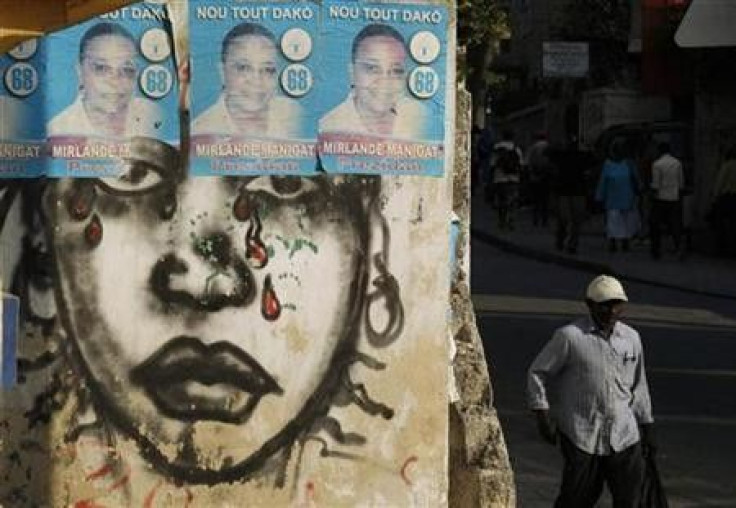Haiti awaits vote results, Aristide backers protest

Supporters in Haiti of exiled former President Jean-Bertrand Aristide demonstrated for his return on Wednesday as the country nervously waited to hear who would contest the presidency in a March run-off election.
Several hundred pro-Aristide protesters set tires aflame in front of the Foreign Ministry in Port-au-Prince, demanding that Haiti's government deliver the diplomatic passport Aristide is requesting to be able to come home from exile in South Africa.
We'll die for Aristide, and Aristide must come back chanted some of the protesters, to the sound of drums.
The Aristide followers demonstrated on the day Haiti's Provisional Electoral Council (CEP) is scheduled to announce definitive first-round results from chaotic November 28 elections that triggered riots and fraud allegations in the poor, earthquake-battered Caribbean state.
The council has to decide who will join former first lady Mirlande Manigat in the March 20 run-off -- popular musician Michel Martelly or government-backed Jude Celestin.
Manigat had the most first-round votes but not enough to win outright. The United States and United Nations have pressed Haitian authorities to accept an Organisation of American States (OAS) revision of initial vote results that recommends putting Martelly in the run-off in place of Celestin.
OAS experts cited irregularities in vote tallies from November's elections.
Expectation of the possible return of Aristide, a firebrand leftist ex-Roman Catholic priest who retains a passionate following in Haiti, has grown since he said last month he was ready to come home today, tomorrow, at any time.
But Washington and western donors, who are trying to keep the contentious presidential election on track after a very confused November 28 first round vote, are wary that Aristide's return could inflame Haiti's fractious political atmosphere.
The Caribbean country, the poorest in the Western Hemisphere, is struggling to recover with foreign help from a devastating 2010 earthquake and is also fighting a cholera epidemic that has killed more than 4,000 people.
As we await publication of electoral results, we note that what Haiti needs right now is a period of calm, not divisive actions that can only distract from the vital task of forming a legitimate and credible government to help Haiti realise a democratic and more prosperous future, a U.S. State Department spokesman in Washington wrote in an emailed response to a question about Aristide's possible return.
The protesters on Wednesday complained of U.S. meddling.
The U.S. has no right to oppose President Aristide's return. We could never have asked (U.S. President Barack) Obama to prevent a former U.S. president from coming back home, so they have no right to interfere with Haitian internal affairs, said Ansico Felix, a leader of the pro-Aristide protest.
GHOSTS FROM THE PAST
Haiti's uncertain outlook has been further clouded by the reappearance of ghosts from its turbulent past. Former dictator Jean-Claude Baby Doc Duvalier came home from exile in January, running into corruption and human rights charges, and Aristide is also preparing his own homecoming.
The United States, United Nations and OAS have weighed in to try to avoid an electoral debacle and more unrest that could threaten billions of dollars of pledged donor reconstruction aid.
Despite a visit on Sunday by U.S. Secretary of State Hillary Clinton to emphasise U.S. backing for the OAS results option, the Provisional Electoral Council (CEP) has given no clear indication that it will follow the OAS recommendation.
Celestin, a protege of outgoing President Rene Preval, has refused to drop out despite pressure from his own INITE party.
But there is some expectation the OAS-recommended Manigat-Martelly line-up for the second round will prevail. Martelly supporters rioted in December when initial results from the electoral council put Celestin in the runoff.
Now the CEP sees what the people want ... They will kick Jude (Celestin) out (of the runoff). It's Martelly we want, said Jean-Claude Dece, 38, a construction worker.
Analysts see the return of Aristide, who became Haiti's first freely elected president in 1990 before being ousted by an armed revolt in 2004, as a potential disruptive wild card.
There are no good options in Haiti but accepting the OAS formula and moving to a second round on March 20 appears to be the best one, Michael Shifter, president of the Washington-based Inter-American Dialogue, told Reuters.
Outgoing President Preval's mandate formally ends on February 7 although he has parliament approval to stay on if necessary until May 14 so he can hand over to an elected successor.
© Copyright Thomson Reuters 2024. All rights reserved.











